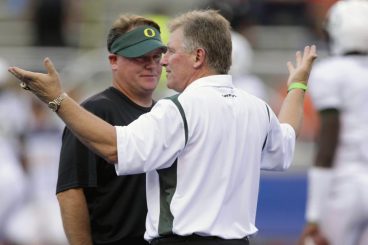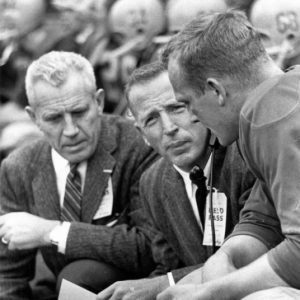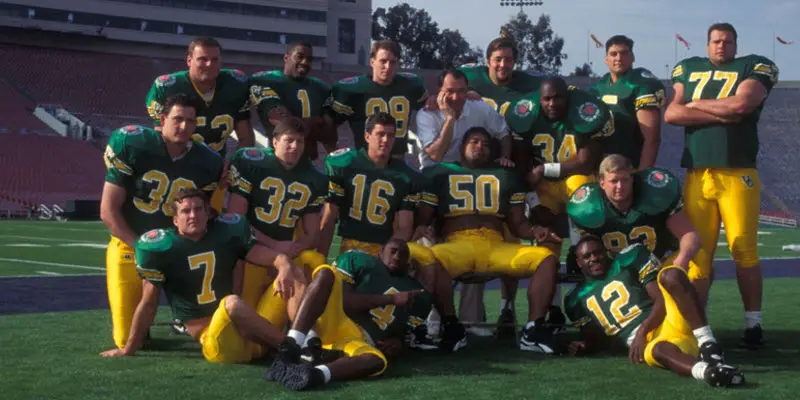The beginning of the new year is always a great opportunity for sitting down and setting goals for the year. As a head football coach, I met with every player on the team for 30 to 45 minutes to discuss their goals. This took basically the whole month of January to complete, but it was time well invested. Most young men (and women) have never been taught the importance of setting goals or how to set them.
Not only were these meetings valuable as a teaching tool, but they also gave me tremendous insight into the players’ expectations. These goal meetings were a great help in establishing relationships.
The importance of goals has been well documented over the years. Greatness and achievement don’t happen by accident. Cal Ripken didn’t accidentally set the record for the most consecutive games. A simple rule is “you get what you set.”
Some other important tips are:
- Set goals in areas of your life. I use a five-point star for five major areas: Spiritual, Family, Professional, Health and Community. Set goals in each of those five areas.

Coach Kelly and Mike Bellotti 2009 at Boise State
- Write all your goals down. Putting your goals on paper is a sign of commitment.
- Never sell yourself short. If you don’t believe in yourself, you’ll never reach your potential. Think big. Ralph Waldo Emerson said “the heroic can’t be common, nor can the common be heroic.” Stretch yourself. It’s better to shoot for greatness and come up short than to shoot for mediocrity and succeed.
- Never let an “expert” discourage you. I doubt that many experts thought a five-foot-seven Spud Webb would win the NBA slam dunk contest. Few experts thought the US Hockey Team would beat the Soviets in the 1980 Winter Olympics.
- Take an organized, logical approach to your goal setting. Follow up your goal-setting process with action. Setting goals is important, but you must follow that up with immediate action.
The system we developed for goal-setting was a series of six questions that not only clearly defined the goals, but also tested their attainability. At the end of the six-question process, your confidence in achieving the goals be well founded. The following is a brief overview of the six questions.
The first question is “What?”
What is your goal? What do you want to accomplish? When you chose your goal, make sure that it is very specific and something you can measure. For example, set a goal of increasing your bench press 25 pounds, rather than a goal of getting stronger.
The second question is “Who?”
Whose goal is it? Is it your goal? Is it your Dad’s goal for you, or your boss’s goal? Unless it is your goal, you will never take ownership of it. Without owning the goal, you probably won’t achieve it.
The third question is “Why?”
Why is it important to you to achieve this goal? The reason you want to achieve a goal is the soul of the goal. The “Why” of the goal is the propelling force behind the goal.

Oregon head coach Len Casanova, assistant coach John McKay, and Oregon QB Jack Crabtree.
The fourth question is “How?”
How do you plan on achieving this goal? What’s the plan? This question gives you goal credibility. Anyone can say they want to be an All-American, but those who know how they plan on accomplishing that goal have a much better chance of actually achieving it. Also, breaking a big goal down into bite-size pieces makes it seem easier to attain. The plan gives you confidence that your goal can happen. The more detailed the plan, the more credibility it has to you. The more credibility it has, the more confidence you have.
The fifth question is “When?”
When will you achieve this goal? Giving your goal a deadline provides a sense of urgency to your plan. Deadlines force you into action. Action separates goal setting from goal getting. Anyone can put a plan together, but plans are worthless without action. Setting deadlines and benchmarks keeps your feet to the fire.
The last question is “Price?”
Are you willing to pay the price to achieve this goal? Is this goal important enough to you that you are willing to pay the price to achieve it? A simple formula is: the greater the goal, the higher the price. If you are not willing to pay the price then you must start the process over again and choose a goal that you are willing to commit to. The last question is a reality check. If you are willing to pay the price, then proceed with massive action.
This is a quick synopsis of the Six Questions of Goal Setting. It’s not just about goal setting; it’s a process of goal getting.
Coach Tony DeMeo
Charleston, West Virginia
Top Photo by John Giustina
If you are interested in a more detailed and expansive version of this system, I have a limited number of DVDs available that explain it in detail. To find out more about my insider football perspective, please visit my website at HTTP://tonydemeo.com/.
Tony DeMeo (Football Analyst) has 25 years experience as a head college football coach, racking up an overall record of 137-108-4. Coach DeMeo recently retired after a six year stretch as the head coach of the University of Charleston, following previous stints at Washburn University, Mercyhurst College, and Iona College. Tony Demeo also spent time as an assistant coach with Richmond, Murray State, Temple, UMass, Delaware, Penn, and Pace University. He has been named Coach of the Year four times, and was elected into the Iona College Hall of Fame in 1997 as a player and coach. He will also be inducted in the Mercyhurst University Hall of Fame in June of 2017 as a coach.
Coach Demeo’s “Triple Gun” offense has set numerous records at multiple schools, and he is an expert on spread offenses, having written numerous books and creating tutorial DVDs on the topic, and is a popular speaker at coaching clinics.
Visit http://tonydemeo.com/ for more information.


